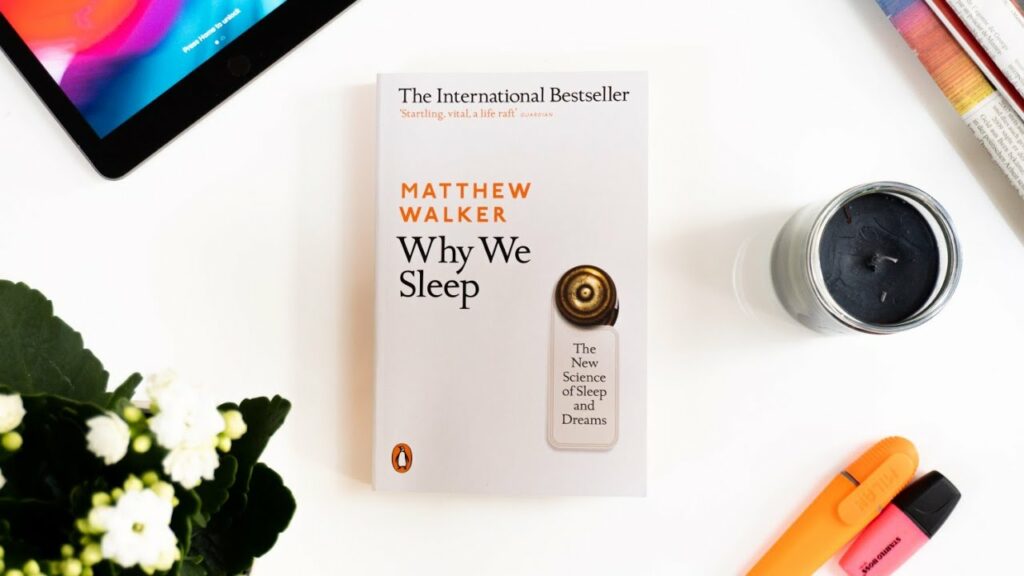Matthew Walker’s “Why We Sleep” is a groundbreaking book that provides an in-depth exploration of the importance of sleep for our health and well-being. In this article, we will summarize the key points of this book and explain why it is essential to prioritize a good night’s sleep.
Before we jump into the summary, here’s a video I made about this book – in case you’d like to watch it instead of reading the article:
The book is divided into four sections, each of which explores a different aspect of sleep. The first section of the book explains what sleep is and why it is essential for our health. Walker argues that sleep is not a luxury, but a biological necessity. Our bodies need sleep to repair and rejuvenate themselves, to consolidate memories, and to regulate our emotions. Without enough sleep, we become more vulnerable to a wide range of physical and mental health problems.
The second section of the book explores the science of sleep. Walker provides an overview of the different stages of sleep, and how each stage contributes to our physical and mental health. He also explains how the sleep cycle is regulated by our circadian rhythms, which are influenced by external factors such as light exposure and social cues.
The third section of the book explores the impact of sleep (or lack thereof) on our health. Walker provides a wealth of research showing that sleep deprivation is linked to a range of health problems, including obesity, diabetes, cardiovascular disease, and cancer. He also explains how lack of sleep can affect our cognitive functioning, including our ability to learn and remember information.
The fourth and final section of the book explores practical strategies for improving our sleep. Walker provides a range of tips for improving sleep hygiene, such as establishing a regular sleep routine, avoiding caffeine and alcohol before bedtime, and creating a comfortable sleep environment. He also discusses the benefits of mindfulness and relaxation techniques, such as meditation and yoga, for promoting restful sleep.
Overall, the book provides a compelling argument for the importance of sleep and the dangers of sleep deprivation. The research cited by Walker suggests that many of us are not getting enough sleep, and that this is taking a toll on our physical and mental health.
So, why is sleep so important? Walker explains that during sleep, our bodies release hormones that promote cell growth and repair. This means that sleep is essential for the repair and regeneration of our tissues and organs, which is vital for our overall health and longevity. In addition, sleep is important for regulating our immune system, which helps to protect us from illness and disease.
But sleep is not just important for our physical health. It is also essential for our mental health and cognitive functioning. During sleep, our brains consolidate memories and process emotions, which is why getting enough sleep is essential for learning and emotional regulation.
Despite the importance of sleep, many of us are not getting enough of it. In fact, research cited by Walker suggests that over one-third of adults are not getting the recommended seven to nine hours of sleep each night. This is a worrying trend, as sleep deprivation is linked to a wide range of health problems, including obesity, diabetes, cardiovascular disease, and cancer.
Fortunately, there are many things we can do to improve our sleep hygiene and get the restful sleep we need. Some of the tips provided by Walker include establishing a regular sleep routine, avoiding caffeine and alcohol before bedtime, and creating a comfortable sleep environment. In addition, mindfulness and relaxation techniques, such as meditation and yoga, can be useful for promoting restful sleep.
In conclusion, Matthew Walker’s “Why We Sleep” provides a compelling argument for the importance of sleep and the dangers of sleep deprivation. The book provides a wealth of scientific research showing the many ways that sleep contributes to our physical and mental health, and the many negative consequences of not getting enough sleep.

